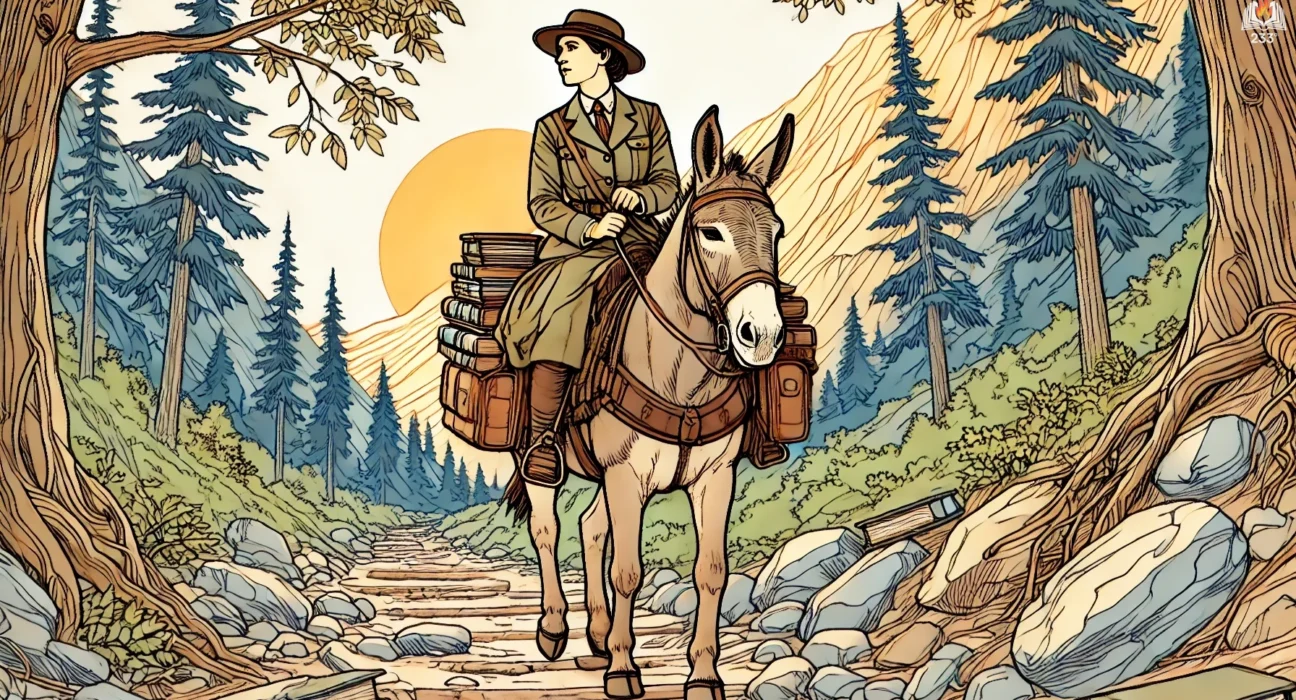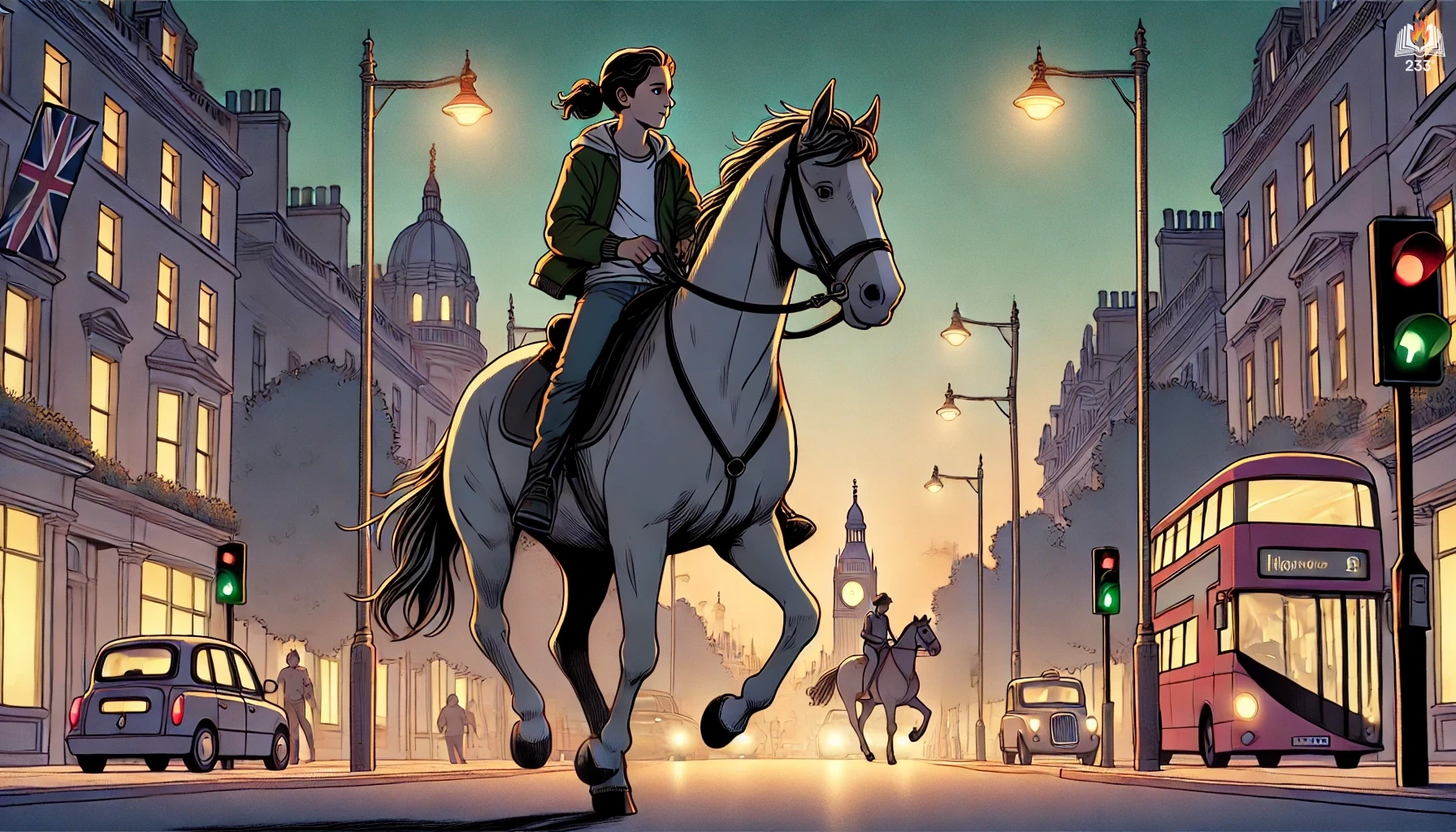The Giver of Stars, a historical novel by Jojo Moyes, was published in 2019 and is inspired by the real-life Pack Horse Library Project, part of President Roosevelt’s Works Progress Administration during the Great Depression. Set in the remote mountains of Kentucky, the novel follows a group of courageous women who defy societal expectations by delivering books to isolated communities. This heartwarming and powerful tale explores themes of female empowerment, friendship, love, and resilience in the face of adversity.
Plot Summary
The wind rolled through the Kentucky mountains, thick with the scent of pine and damp earth, as Alice Van Cleve rode out for the first time, her heart pounding in her chest. The little mare beneath her shifted uneasily, sensing her rider’s hesitation. Just a few months ago, Alice had been thousands of miles away, wrapped in the quiet suffocation of an English drawing room, longing for adventure. Now, married to Bennett Van Cleve, she had exchanged one prison for another—a house in Baileyville where her domineering father-in-law ruled with an iron grip, and her husband, well-meaning but spineless, never defied him.
The town was small, bound by rigid rules and quiet judgments. Women tended to their homes, men worked in the mines, and newcomers like Alice were watched with suspicion. But something inside her rebelled against the life she was expected to lead. So when a call was made for volunteers for Eleanor Roosevelt’s traveling library initiative, Alice raised her hand. The job would take her deep into the mountains, delivering books to those who had never held one in their hands, reaching families who lived in isolation, their worlds hemmed in by distance and hardship.
Margery O’Hare, already known for her independence, was the first to step forward. Fierce and self-sufficient, Margery had grown up wild, the daughter of a feared bootlegger. People whispered about her—her sharp tongue, her refusal to marry, the way she seemed to answer to no man. But Margery did not concern herself with their gossip. She had her own rules, her own way of living, and she had long since decided that she would carve out her life as she saw fit. She rode her mule, Charley, through the mountains as easily as breathing, carrying books to those who needed them, believing that stories had the power to change even the most battered souls.
Alice was not the only one drawn to the packhorse library. Beth Pinker, all rough edges and fiery determination, joined despite her family’s protests. Isabelle “Izzy” Brady, timid but longing for more than the quiet life her mother had planned for her, found a place among them. Sophia Kenworth, the only Black woman in Baileyville, once a gifted librarian, took refuge in the library after being pushed out of her rightful place at the town’s main library. Together, they formed a group of women bound not by blood but by something just as strong—purpose.
As the weeks passed, the mountains became a place of solace for Alice, the dusty trails a path to something more than just books. She rode through dense forests, past hollows where children ran barefoot and women clutched books to their chests as if they were gold. The land was rough, unpredictable, but there was a beauty in it—a beauty she had never known in the manicured gardens of England. The mountains whispered secrets to those who dared listen, and Alice, for the first time, felt free.
But not everyone welcomed the librarians. The mine owners, including Bennett’s father, saw no use for books among the workers and their families. Educated men began to ask questions. Educated women might decide they wanted more than a life of silence and obedience. And Margery, with her unyielding defiance, was a thorn in their side.
Trouble came slowly, like a storm gathering on the horizon. Clem McCullough, a drunken brute with a vendetta against the O’Hares, cornered Margery on the trail one evening. His rifle was cocked, his breath thick with alcohol, his rage simmering just beneath the surface. He accused her of poisoning the minds of good women, of spreading ideas that did not belong in these mountains. She did not cower, did not plead. But when the gun was raised, instinct took over. A book—a heavy volume from her saddlebag—became her weapon. The force of her swing knocked Clem to the ground, his own gun firing wildly into the trees. She rode hard, heart pounding, knowing this was far from over.
Clem was found dead the next morning, his body half-buried in the creek bed. The town turned on Margery, whispering of vengeance, of long-standing feuds, of justice that must be served. The sheriff came for her, and despite her protestations of innocence, she was locked in a cell, awaiting judgment.
Alice, Beth, Izzy, and Sophia refused to let her stand alone. They rode together, speaking out, searching for the truth. In a town where women were expected to stay quiet, they made noise. They uncovered evidence that Clem had been in another fight earlier that night, a fight that left him stumbling and broken long before Margery ever crossed his path. It did not matter to the men who sought to keep their women in line. They wanted a lesson taught.
Alice’s own battles came to a head in those days. Bennett, his father’s shadow, demanded she step away, return home, behave as a wife should. But she was no longer the girl who had arrived in Baileyville, naïve and eager to please. She had seen the world beyond their front porch, felt the wind in her hair as she rode through the valleys, delivered books to those who treasured them more than she had ever imagined. She had felt something stir inside her that could not be quieted.
And then there was Fred Guisler, the gentle, steadfast man who had supported the library from the start. His hands, rough from years of work, were kinder than any Alice had ever known. He saw her, truly saw her, and when he spoke of a life outside of the confines of the Van Cleve house, she listened.
The trial came, thick with accusations, with threats, with the weight of old grudges. Margery stood defiant, unbowed even as the town turned against her. But the truth had a way of surfacing, and when it did, it set her free. Not just from prison, but from the chains of a past that had bound her for too long.
Alice did not return to the Van Cleve house. She did not wait for permission or beg for understanding. She chose her own path, one that led not back to England, nor to the cold halls of her husband’s family home, but forward—into the mountains, into the arms of those who had become her true family, into a future where she could breathe, where she could love, where she could be herself.
The packhorse librarians continued their work, riding through storms, through heat, through the ever-shifting landscape of a world that did not always welcome them. But they rode nonetheless, books strapped to their saddlebags, stories waiting to be told.
And in the quiet of the mountains, where the wind carried whispers of those who had come before, Alice Van Cleve rode on, free at last.
Main Characters
- Alice Van Cleve – A young Englishwoman who moves to rural Kentucky after marrying Bennett Van Cleve. She feels trapped in a stifling marriage and finds purpose and independence as part of the Packhorse Librarians.
- Margery O’Hare – A fiercely independent, strong-willed woman with a reputation for being wild and unconventional. She is the leader of the packhorse librarians and fights against social norms and personal vendettas.
- Bennett Van Cleve – Alice’s husband, a man torn between his love for Alice and his loyalty to his overbearing father.
- Mr. Van Cleve – A wealthy mine owner and Bennett’s father, who embodies the oppressive patriarchy of the time, opposing the library initiative and treating Alice as a possession.
- Beth Pinker – A fellow librarian, feisty and determined, who joins the packhorse project despite societal disapproval.
- Izzy Brady – A shy and physically disabled young woman who gains confidence and strength through her role in the library project.
- Fred Guisler – A kind-hearted horseman who supports the library and shares a growing bond with Alice.
- Nancy – An elderly woman devoted to reading, symbolizing the importance of literature to the isolated communities.
Theme
Female Empowerment and Solidarity: The novel highlights the strength of women who defy traditional gender roles. As packhorse librarians, they carve out a space of independence in a male-dominated society.
The Power of Literature: Books serve as a symbol of freedom and transformation. They open doors for education, imagination, and connection in a harsh and isolating landscape.
Love and Liberation: The novel explores different kinds of love—romantic, platonic, and self-love. Alice’s journey is one of finding herself outside of an oppressive marriage and seeking true companionship.
Social Injustice and Class Struggles: The story paints a vivid picture of the economic disparities in Appalachia, addressing issues like poverty, lack of education, and the exploitation of miners.
Nature as Both Refuge and Challenge: The rugged beauty of the Kentucky mountains is a central backdrop, offering both a sense of freedom and a formidable challenge to those who dare to navigate its treacherous terrain.
Writing Style and Tone
Jojo Moyes’ writing style is immersive and lyrical, rich in descriptive prose that brings the Appalachian landscape to life. She masterfully balances historical detail with engaging storytelling, allowing readers to feel the weight of the characters’ struggles while also celebrating their triumphs. The dialogue is natural and often infused with humor, making the characters’ interactions feel authentic and relatable.
The tone of the novel shifts between hopeful, tender, and intense, mirroring the hardships and triumphs of the women at its center. There is a warmth and intimacy to the storytelling, making the reader deeply invested in the characters’ journeys. Moyes skillfully builds tension, particularly in moments of danger and confrontation, ensuring that the novel remains gripping and emotionally compelling.
We hope this summary has sparked your interest and would appreciate you following Celsius 233 on social media:
There’s a treasure trove of other fascinating book summaries waiting for you. Check out our collection of stories that inspire, thrill, and provoke thought, just like this one by checking out the Book Shelf or the Library
Remember, while our summaries capture the essence, they can never replace the full experience of reading the book. If this summary intrigued you, consider diving into the complete story – buy the book and immerse yourself in the author’s original work.
If you want to request a book summary, click here.
When Saurabh is not working/watching football/reading books/traveling, you can reach him via Twitter/X, LinkedIn, or Threads
Restart reading!








